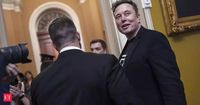The Department of Government Efficiency (DOGE), spearheaded by entrepreneur Elon Musk, is implementing significant changes in the Small Business Administration (SBA) in a bid to eradicate fraudulent lending practices. Amid growing concerns about improper loans issued to individuals of improbable ages, such as a 157-year-old, the SBA is now prioritizing stringent verification measures to enhance the integrity of its loans.
Effective immediately, the SBA will require all loan applicants to provide their date of birth and will bar individuals under 18 or over 120 years of age from securing direct loans. The new rule comes as part of an urgent response to recent findings that revealed disturbing instances of fraud within federal loan programs. According to DOGE, between 2020 and 2021 alone, more than 3,000 loans worth a staggering $333 million were issued to individuals registered as older than 115 years in the Social Security database.
Musk has long voiced concerns regarding the outdated and inaccurate nature of the Social Security records, claiming that millions of deceased individuals remain listed as alive, potentially allowing for fraudulent benefits and loans. He noted, “Approximately 3.2 million number holders, all listed age 120+, have now been marked as deceased. More work still to be done.” His comments resonate with sentiments expressed by former U.S. President Donald Trump, who has similarly pointed out that the system overlooks numerous centenarians still listed as active recipients.
Beyond these lending changes, DOGE has shifted its focus to addressing inefficiencies in governmental spending by auditing unused government-issued credit cards. Over the past month, nearly 300,000 of these cards have been cancelled after a thorough audit, revealing misuse and waste. Musk indicated that as of now, there remain approximately 4.6 million active cards/accounts, underscoring a continued aim to streamline government financial operations.
The scope of this initiative extends beyond the SBA, as the agency plans to drastically cut its workforce by 43%, resulting in about 2,700 job eliminations. In a statement, SBA Administrator Kelly Loeffler defended the need for these cuts, suggesting they will help restore the agency's efficiency to levels seen during the early Trump administration—an era she credits with significant economic growth.
“Just like the small business owners we support, we must do more with less,” Loeffler asserted. Furthermore, other federal agencies are also bracing for staff reductions: the Environmental Protection Agency (EPA) may cut its scientific research office, affecting over 1,000 scientists, while the Internal Revenue Service (IRS) is poised to reduce its ranks by 18,000 employees. Similarly, the Department of Veterans Affairs is evaluating potential organizational changes that could lead to 80,000 job losses.
Despite the controversial nature of these sweeping changes, which have drawn both praise and criticism, Musk and DOGE maintain that their intentions are to curb unnecessary spending and enhance government efficiency. According to announcements from DOGE, the initiative claims to have saved the U.S. government around $115 billion since its inception on January 20, 2025, although independent verification of these savings remains limited. As of mid-March, verifiable savings reported stood at only $8.6 billion, significantly lower than Musk's ambitious trillion-dollar goal.
The SBA will also incorporate the administration of federal student loans, a function previously managed by the Department of Education. This strategic move is part of a larger reorganization that officials claim will enable more effective funding for America’s small businesses, which as of 2023, employ over 61.6 million individuals across approximately 33.3 million small businesses nationwide.
Underlying all these reforms is an urgent call to restore integrity and efficiency to federal programs, particularly in light of the irregularities exposed in the SBA loan process. In many ways, the criticism of past management practices has fueled the current wave of restructuring, with officials indicating that the agency had drifted from its original mission of supporting small businesses.
“The SBA was created to be a launchpad for America’s small businesses by offering access to capital,” Loeffler emphasized, “But in the last four years, the agency has veered off track, doubling in size and plagued by financial mismanagement.”
As these transformations unfold, the Biden administration's stance on workload reductions, financial oversight, and fraud minimization remains pivotal. Proponents of Musk's reforms argue that they are long overdue, while detractors warn that such aggressive cuts may ultimately weaken essential public services provided by these agencies.
The real question moving forward is whether DOGE's tough measures will genuinely enhance operational efficiency or lead to unintended consequences affecting the very fabric of federal support systems. For now, Musk is unwavering in his mission to reshape government finance, encouraging a new era of accountability and streamlined expenditure.
As this ongoing saga reveals itself, one thing becomes clear: the stakes are high for both small businesses relying on these loans and the many federal employees poised to feel the crunch of substantial workforce reductions. Time will tell how effective these measures will be in fostering a more reliable and efficient government.







